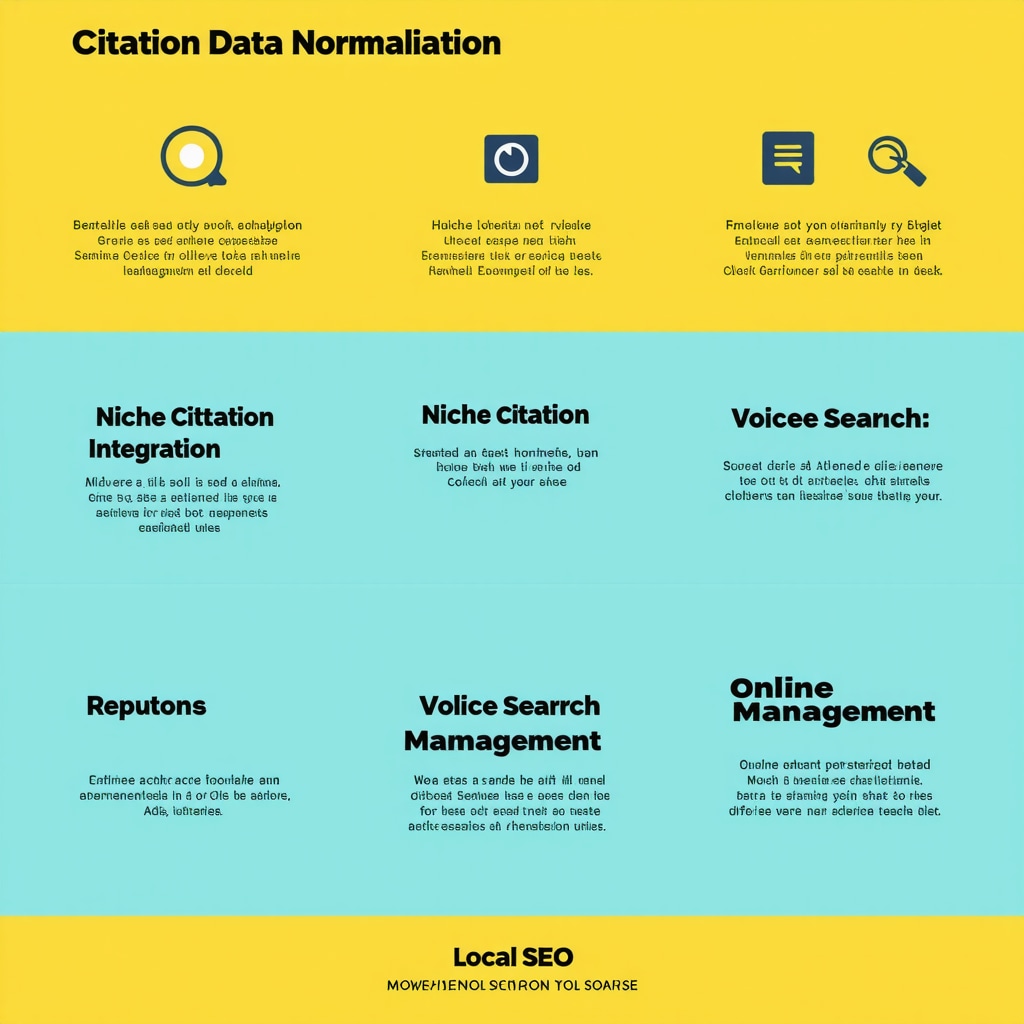Harnessing the Power of Citation Management for Local Business Growth
In the competitive landscape of local business, visibility is king. One of the most underestimated yet profoundly effective strategies for boosting local search presence is citation management. By ensuring your business’s name, address, and phone number (NAP) are consistently and accurately listed across authoritative online directories and platforms, you can significantly enhance your local SEO performance and attract more customers. This article dives into expert-driven insights on how citation management can be a game-changer for your local business growth strategies.
Why Consistency in Local Citations is the Cornerstone of Trust and Ranking
Local citations act as digital references that signal to search engines the legitimacy and relevance of your business within a specific geographic area. However, inconsistencies in NAP details across different citation sources can confuse algorithms and dilute your ranking potential. For example, a local bakery found that by auditing and correcting over 50 inconsistent citations, they saw a 30% increase in local search traffic within three months. This illustrates that citation accuracy is not just about being found but about building trust with both search engines and potential customers.
Strategic Placement: Beyond Quantity to Quality in Citation Profiles
Not all citations are created equal. Prioritizing placements on high-authority platforms relevant to your industry and location yields far better SEO dividends than mass submissions to low-quality directories. Using tools like Moz Local can help you identify and manage your top citation sources efficiently, ensuring your business information is not only widespread but also authoritative. This approach aligns with the latest local SEO best practices that emphasize quality over quantity, ensuring sustainable growth rather than temporary ranking spikes.
How Does Citation Management Influence Your Google Business Profile Ranking?
Citation management directly impacts your Google Business Profile (GBP) by reinforcing the consistency and credibility of your business information across the web. GBP is a critical factor for local search visibility and ranking in Google’s Local 3-Pack. Properly managed citations enhance GBP’s trust signals, improving your chances to appear prominently in local search results. According to Moz’s Local SEO guide, citation signals are a fundamental component of local ranking factors, working synergistically with reviews and backlinks to elevate your online presence.
Implementing an Effective Citation Management Workflow
Successful citation management requires a systematic approach: first, conduct a comprehensive audit of existing citations to identify inaccuracies; second, update and correct NAP details on all platforms; third, expand your citation footprint by targeting niche and local directories; and finally, establish regular monitoring to maintain citation health. Integrating this workflow with your overall local SEO strategy, including optimizing your Google Business Profile, can multiply growth outcomes. For detailed strategies on optimizing your Google Business Profile, see our guide on how to optimize your Google Business listing effectively.
Engage with Us: Share Your Citation Management Success Stories or Challenges
Have you implemented citation management for your local business? We invite you to share your experiences or questions in the comments below. Engaging with the community can uncover new tactics and inspire innovative solutions for local SEO growth.
Why Regular Citation Audits are Essential for Long-Term SEO Success
From my experience working with small businesses, one of the biggest mistakes I see is treating citation management as a one-and-done task. Initially, you might get all your listings corrected and consistent, but over time, without regular audits, discrepancies creep back in. Businesses move, phone numbers change, or new platforms pop up, causing outdated or conflicting information to spread. This inconsistency can severely impact your local rankings and confuse potential customers.
To avoid this, I recommend scheduling quarterly citation audits. This proactive approach helps catch and correct errors before they negatively affect your SEO. Personally, I use a combination of manual checks and automated tools like Moz Local and BrightLocal, which streamline the process and keep me informed about any changes. For those interested in diving deeper into citation audits and management, this guide on GMB citation management offers excellent practical tips.
Integrating Citation Management with Other Local SEO Tactics
Citation management is powerful on its own, but when combined with other local SEO strategies, the results are exponential. For example, pairing consistent citations with regular Google Business Profile updates, engaging with customer reviews, and optimizing local keywords can significantly boost your visibility.
When I helped a local gym improve their online presence, we focused on cleaning up their citations while simultaneously enhancing their Google Business listing and encouraging members to leave reviews. Within a few months, their local search traffic increased by over 40%, and their membership inquiries rose noticeably. This holistic approach is why you might want to explore resources on mastering Google Business SEO to complement your citation efforts.
What Are the Common Challenges in Citation Management and How Can You Overcome Them?
Many business owners ask me why citation management feels overwhelming or why their efforts don’t always yield expected results. The truth is, challenges like inconsistent data entry, duplicate listings, and managing citations across numerous platforms can be daunting. Additionally, some directories might require manual verification or have outdated processes.
My advice: start small by focusing on the most impactful citation sources relevant to your industry and location. Use tools to detect duplicates and inconsistencies, then tackle updates systematically. Also, don’t hesitate to seek professional help if the task becomes unmanageable. A well-maintained citation profile not only improves rankings but also builds credibility and customer trust.
Reflecting on the Impact of Citation Management in Today’s SEO Landscape
Reflecting on my journey with local SEO clients, I realize that citation management remains a foundational pillar despite evolving algorithms and SEO trends. Google and other search engines increasingly emphasize trust, authority, and user experience. Consistent, accurate citations contribute directly to these signals.
According to a recent study by Search Engine Land, local citations continue to be a key ranking factor in Google’s local search algorithm, underscoring the importance of diligent citation management for small businesses aiming to compete locally. This aligns with my personal experience where steady citation improvements often precede noticeable ranking gains.
For those looking to expand their local SEO toolkit, consider exploring comprehensive local SEO optimization techniques that include citation management as a core component.
Engage with Us: What Has Your Experience Been with Citation Management?
Now, I’m curious—how has citation management impacted your local business or SEO efforts? Have you faced unexpected challenges, discovered helpful tools, or seen tangible growth? Share your stories or questions in the comments below. Let’s learn from each other’s journeys and build stronger local SEO strategies together.
Deep-Dive into Citation Data Normalization for Superior Local SEO Performance
While the importance of citation consistency is widely acknowledged, the nuanced process of citation data normalization often remains underexplored. This advanced tactic involves standardizing how your business data is presented across diverse platforms, ensuring uniform formatting for your NAP details, business categories, and even service descriptions. For instance, abbreviations like “St.” versus “Street” or formatting phone numbers with country codes can cause subtle discrepancies that confuse search engine crawlers.
Implementing a rigorous normalization protocol means establishing a definitive source of truth for your business information and applying these conventions systematically during citation submissions and audits. Sophisticated tools and scripts can assist in detecting variations and automatically correcting them, but a manual review remains critical to catch platform-specific quirks. This level of granularity fortifies your local SEO foundation by minimizing algorithmic ambiguity.
Leveraging Niche-Specific and Hyperlocal Citation Opportunities to Outrank Competitors
Beyond mainstream directories, targeting niche-specific and hyperlocal citation sources can unlock untapped SEO advantages. For example, a local law firm might pursue citations on state bar association directories, legal marketplaces, and community-focused platforms, while a boutique café could benefit from listings on neighborhood food blogs or local event calendars.
This focused approach not only diversifies your citation portfolio but also attracts highly relevant traffic, improving both user engagement and conversion rates. To identify these opportunities, consider collaborating with local chambers of commerce, industry associations, and regional business coalitions. Integrating these citations with your broader SEO and marketing strategies creates a powerful synergy that elevates your brand’s local authority.
How Can Businesses Effectively Scale Citation Management Without Sacrificing Accuracy?
Scaling citation management presents a paradox: increasing breadth often risks compromising data accuracy and consistency. Businesses grappling with numerous locations or frequent changes must strike a balance between automation and human oversight. Employing advanced citation management platforms with API integrations enables real-time synchronization of business data across multiple directories, reducing manual errors.
However, automation should be complemented with periodic manual audits, especially after significant business updates such as relocations or rebranding. Training internal teams or partnering with specialized local SEO agencies can ensure that the nuances of citation integrity are preserved at scale, maintaining both search engine trust and customer confidence.
For deeper insights on scalable citation management solutions, see the comprehensive analysis by BrightLocal, a leader in local SEO research and tools (BrightLocal Citation Management Guide).
Integrating Citation Signals with Emerging Local SEO Trends: Voice Search and Mobile Optimization
The evolving landscape of local search demands that citation management adapts to new user behaviors and technologies. Voice search, powered by virtual assistants like Google Assistant and Siri, often interprets queries differently, relying heavily on accurate and consistent citation data to deliver precise results.
Moreover, mobile-first indexing by search engines means that citations must be optimized for platforms frequently accessed via smartphones, ensuring quick load times and seamless user experiences. Businesses should audit their citation profiles not only for accuracy but also for mobile compatibility and relevance to voice search queries.
Anticipating these trends by integrating structured data markup (Schema.org) related to local business information further enhances the visibility and accessibility of your citations in diverse search contexts.

Understanding the Interplay Between Citation Management and Online Reputation for Competitive Edge
While citations primarily influence local SEO rankings, their role in shaping online reputation is equally critical. Consistent citations across reputable platforms reinforce brand credibility, but they also serve as gateways for customer reviews and feedback. Mismanaged citations can lead to fragmented review profiles, confusing potential customers and diluting positive sentiment.
Proactively managing your citations alongside reputation management strategies ensures that your business presents a unified, trustworthy image. This holistic approach can improve not only your search rankings but also customer acquisition and retention rates.
Engage with Us: What Advanced Citation Management Techniques Have You Found Effective?
If you’ve experimented with citation normalization, niche citation sourcing, or scaling solutions, we’d love to hear about your experiences. Share your insights, challenges, or questions in the comments below to foster a deeper understanding of these complex local SEO facets.
Mastering Citation Data Normalization for Impeccable Local SEO Precision
Delving deeper into citation data normalization reveals its pivotal role in eliminating subtle inconsistencies that can impede local SEO efficacy. This process mandates establishing a canonical format for every element of your business data — from the expansion of abbreviations (e.g., “Rd.” to “Road”) to standardized phone number formats inclusive of country codes. Such meticulous harmonization amplifies search engines’ ability to confidently associate your listings, thereby consolidating ranking signals. Employing sophisticated normalization scripts alongside manual verification safeguards against platform-specific formatting anomalies, ultimately fortifying your digital footprint’s integrity.
Unearthing Untapped Potential with Hyperlocal and Industry-Specific Citation Networks
Strategically targeting hyperlocal and niche-specific citation sources offers a competitive edge that transcends generic directory listings. For instance, a boutique spa might leverage citations on local wellness blogs, chamber of commerce registries, and industry-specific aggregators to capture a highly targeted audience. This deliberate diversification not only enhances citation authority but also increases the quality of inbound traffic, fostering higher conversion rates. Collaboration with community organizations and sector associations can reveal bespoke citation opportunities, facilitating a more nuanced and impactful local SEO strategy.
How Can Businesses Effectively Scale Citation Management Without Sacrificing Accuracy?
Scaling citation management presents a paradox: increasing breadth often risks compromising data accuracy and consistency. Businesses grappling with numerous locations or frequent changes must strike a balance between automation and human oversight. Employing advanced citation management platforms with API integrations enables real-time synchronization of business data across multiple directories, reducing manual errors. However, automation should be complemented with periodic manual audits, especially after significant business updates such as relocations or rebranding. Training internal teams or partnering with specialized local SEO agencies can ensure that the nuances of citation integrity are preserved at scale, maintaining both search engine trust and customer confidence. For deeper insights on scalable citation management solutions, see the comprehensive analysis by BrightLocal, a leader in local SEO research and tools (BrightLocal Citation Management Guide).
Aligning Citation Strategies with Emerging Local SEO Paradigms: Voice Search and Mobile Optimization
The rapidly transforming local search ecosystem necessitates citation strategies that embrace emerging trends such as voice search and mobile-first indexing. Voice-activated queries rely heavily on precise and uniformly formatted citation data to deliver accurate responses via virtual assistants like Google Assistant and Siri. Concurrently, with mobile devices constituting the majority of local searches, citations must be optimized for mobile accessibility, including fast load times and responsive design. Implementing structured data markup (Schema.org) tailored to local business information further enhances citation visibility across diverse search modalities, ensuring your business remains discoverable in an evolving digital landscape.

Synergizing Citation Management with Online Reputation for Sustained Competitive Advantage
Beyond their SEO utility, citations serve as foundational elements in sculpting your business’s online reputation. Consistent listings across authoritative platforms not only bolster search rankings but also unify customer review channels, streamlining reputation management efforts. Inconsistencies or duplicate citations can fragment reviews, diminishing trustworthiness and confusing prospective clients. A comprehensive approach that integrates citation accuracy with proactive reputation management fosters a credible and trustworthy brand image, which is indispensable for long-term customer acquisition and retention.
Engage with Us: Share Your Advanced Citation Management Experiences and Insights
Have you integrated citation normalization, niche-specific citations, or scalable management systems into your local SEO framework? We invite you to share your sophisticated tactics, challenges, or queries in the comments section below. Engaging with a community of experts enriches collective knowledge and accelerates the mastery of complex citation management methodologies.
Frequently Asked Questions (FAQ)
What exactly are local citations and why do they matter?
Local citations are online mentions of your business’s name, address, and phone number (NAP) on directories, websites, apps, and social platforms. They signal to search engines that your business exists and operates in a specific geographic area, helping improve local search rankings and visibility. Accurate citations foster trust from both algorithms and potential customers.
How often should I audit my citations to maintain SEO benefits?
Regular citation audits are essential, ideally every quarter. Businesses often experience changes in address, phone numbers, or other details, and new directories emerge over time. Quarterly audits help identify and correct inconsistencies promptly, preserving your local search ranking and preventing customer confusion.
Can I automate citation management without losing accuracy?
Automation tools with API integrations can streamline citation updates across multiple platforms, especially for businesses with multiple locations. However, automation must be complemented by manual audits and oversight to catch platform-specific quirks and prevent data errors. Balancing automation with human review ensures accuracy at scale.
What role does citation data normalization play in local SEO?
Citation data normalization means standardizing how your business information is formatted and presented across all listings—for example, consistently spelling out “Street” instead of “St.” or formatting phone numbers uniformly. This reduces discrepancies that confuse search engines, strengthening your local SEO signals and improving ranking consistency.
Are niche-specific and hyperlocal citations more valuable than general directories?
While general high-authority directories are important, niche-specific and hyperlocal citations often provide stronger relevance and higher engagement from your target audience. These citations align your business with specialized communities or geographic micro-markets, improving both search authority and conversion quality.
How can citation management influence my Google Business Profile ranking?
Consistent, accurate citations reinforce your Google Business Profile’s trustworthiness by confirming your business details across the web. This synergy improves the likelihood of featuring prominently in Google’s Local 3-Pack and enhances local search visibility, driving more traffic and leads.
What are common challenges in citation management and how can I overcome them?
Typical challenges include duplicate listings, inconsistent data entry, and managing numerous citation sources. Overcome these by prioritizing high-impact directories, using tools to detect duplicates, implementing normalization standards, and considering professional assistance for complex scenarios.
How do voice search and mobile optimization affect citation strategies?
Voice search relies heavily on precise, consistent citation data to provide accurate spoken answers through assistants like Siri or Google Assistant. Mobile optimization requires that citation sources and your listings load quickly and display properly on smartphones. Incorporating structured data markup (Schema.org) enhances citation visibility across these emerging search modalities.
Is citation management linked to online reputation?
Yes, consistent citations unify customer reviews and feedback across platforms, aiding reputation management. Mismanaged citations can fragment reviews and confuse customers, undermining trust. Integrating citation accuracy with reputation strategies builds a credible, trustworthy brand image.
How can small businesses scale citation management effectively?
Scaling requires combining automated tools for widespread updates with manual verification to maintain data integrity. Training in-house teams or partnering with specialized SEO agencies ensures nuanced citation management at scale without sacrificing accuracy or trustworthiness.
Trusted External Sources
- Moz Local SEO Guide – Provides comprehensive insights into local SEO fundamentals, citation importance, and ranking factors, serving as a cornerstone for understanding citation management’s role in local search visibility.
- BrightLocal Citation Management Guide – Offers expert analysis and practical tools for citation monitoring, scaling, and audit processes, essential for businesses aiming for efficient and accurate citation workflows.
- Search Engine Land Local SEO Research – Features up-to-date studies and reports on local search algorithm updates, citation impact, and emerging trends like voice search, providing data-driven context to citation strategies.
- Google’s Structured Data Documentation (Schema.org) – Details implementation of structured data markup for local businesses, crucial for enhancing citation visibility in voice and mobile search environments.
- Local Chamber of Commerce Websites and Industry Associations – Serve as authoritative niche and hyperlocal citation sources, offering valuable listings that improve local relevance and customer trust.
Conclusion
Mastering citation management is indispensable for local businesses striving to elevate their online presence and outpace competitors. Consistent, normalized citations across authoritative and niche platforms reinforce your Google Business Profile, amplify trust signals, and drive higher local search rankings. The integration of regular audits, strategic placement, and alignment with emerging trends like voice search and mobile optimization ensures a robust, future-proof local SEO foundation.
Moreover, synergizing citation efforts with reputation management fosters a credible brand image that resonates with customers and search engines alike. Whether you are a small business owner or managing multiple locations, adopting a systematic, expert-informed citation workflow is key to sustainable growth.
We encourage you to apply these advanced citation management strategies, explore related expert content, and share your experiences or questions to deepen collective knowledge. Engage with our community to transform your local SEO journey and realize tangible business growth.



I’ve found that maintaining consistent citations can be quite a task, especially for businesses that are expanding or relocating frequently. Using automated tools like Moz Local or BrightLocal certainly eases the process, but I’ve experienced firsthand how regular manual audits are essential. In my own experience, quarterly checks have prevented numerous discrepancies that could have negatively impacted our local rankings. It’s interesting to see how small mistakes like an abbreviation or outdated phone number can dilute SEO signals.
I’m curious, how do other business owners integrate citation audits into their routine without it becoming too time-consuming? Do you have any tips for balancing automation with manual oversight effectively? The idea of hyperlocal and niche citations is new to me — I’d love to hear about successful strategies for identifying these high-value sources in specific industries.